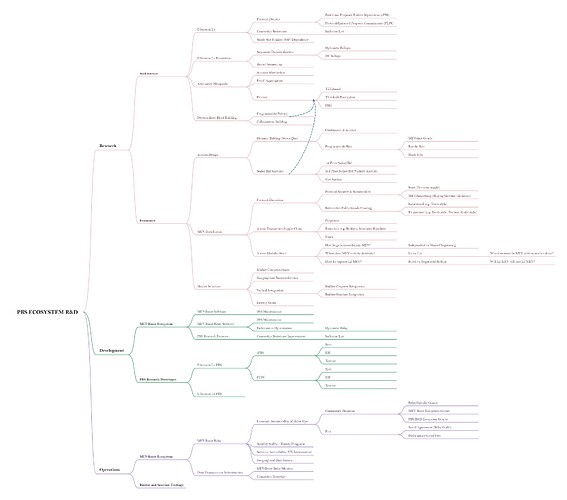Continuing the discussion from MEV-Week Paris: From Zero Sum To Positive Sum:
PBS.Salon - Jul 17, 2023 (Monday)
Please note this event has concluded, the speaker slides have been added to each talk. We will publish a salon recap in the thread soon.
If your application has not been approved, help us understand your interest in the topics of the discussion by posting your research questions and what you would like to share ahead of the salon in this forum thread.
16:00-17:00 Co-Creating An Open PBS R&D Mindmap (Host: TINA)
- Warm up: Draw your own interpretation of the chaordic transaction supply chain diagram in any level of abstraction.
- Co-creation: Help update the following napkin mind map, spot what’s missing, and suggest alternative framing.
- Contribution: Identify your area of expertise and interest on the PBS ecosystem R&D mind map.
Disclaimer: Below is TINA’s shower-thought ELI-5 mindmap on the scope of PBS R&D Roadmap. It started from a napkin diagram and had gone through a couple iterations based on feedback from researchooors. Dropping it here to trigger YOU to create a better one, because none of us has a global view, and help from each of you in PBS R&D is important, so that There Is No Asymmetry
17:00-17:20 A Modest Proposal to Simulate PBS/Intent Interaction (Slides | FRP) by Fabrizio Romano Genovese
- Abstract: An architectural draft in open games to simulate PBS auctions while taking care of intents. The design is meant to be compositional, so that complex scenarios can be simulated by putting together simpler blocks into more complex ones.
- Researchers’ Challenges: I’d like honest opinions by people actively working with intents in the context of PBS (relayers, infrastructure builders, validators,…) about what can be modified or be improved about the design
17:20-17:50 Measuring the Concentration of Control in Contemporary Ethereum (Slides |WIP Paper) by Simon Brown (recording)
- Abstract: This talk explores ways that we can try to measure Ethereum’s effective level of decentralization as the network continues to evolve over time, and why it matters.
- Researcher’s Challenges:
- What are the dimensions of measurement we should consider or not consider and why?
- What is an effective model for establishing the criteria for measurement?
[/details]
17:50-18:20 A Lot Can Happen in 12 Seconds (Slides) by Max Resnick (recording)
- Abstract: When prices move a lot on Binance in the 12 second window before the PBS auction concludes, certain ‘HFT’ builders are much more likely to win because they have the ability to arbitrage centralised and decentralised exchanges. We demonstrate this empirically, by showing that a small group of HFT builders are much more likely to win blocks when pre-block volatility is high. We then discuss the implications of this advantage in the context of order flow auctions and private order flow. We argue that HFT builders who specialise in top-of-block arbitrage, naturally have an advantage when bidding in order flow auctions, this suggests that HFT builders will dominate PBS auctions when significant order flow is sold in order flow auctions. We suggest ‘unbundling PBS’ as a potential way to mitigate this centralising force.
- Researcher’s Challenges:
- Can SUAVE compete with integrated builder searchers in high-volatility blocks?
- Does unbundling PBS make sense, how could we accomplish this in ePBS designs?
18:20 - 19:00 Lay of the Land in PBS R&D by Justin Drake (EF)
- Tl;dr: An optimistic outlook on PBS R&D—how the puzzle pieces are coming together.
19:00 - 19:30 PEPC: Theoretical Foundations and Practical Implementations (Slides) by Diego & Barnabé Monnot (EF RIG)
- Tl;dr: An in-depth exploration of Protocol-Enforced Proposer Commitments (PEPC) in the Ethereum protocol. It delves into the motivation behind PEPC, its theoretical foundations, and possible paths to implementation. The presentation concludes with open questions and future directions for PEPC, inviting further research and development.
- Researcher’s Challenges:
- What are the limitations of the current Ethereum protocol that necessitate the introduction of PEPC?
- What are the trade-offs associated with implementing PEPC at the network level?
- Where do commitment devices fall short as an abstraction to use for PEPC?
- What is the minimal spanning set of changes to the Ethereum specs that would allow for PEPC?
- Is the system fully resilient to reorgs? Where can value be extracted from and how?
- What are the most useful contracts that could be enabled by PEPC?
19:30 - 20:00 Evolution of ePBS Designs and Future Roadmap (Slides) by Mike Neuder (EF ARG)
- Tl;dr: Exploring the iteration of ePBS designs. starting with the original two-slot proposal, we detail the issues around giving full fork-choice privileges to builder blocks in terms of reorg vulnerability. We discuss payload view merge, a design we quickly realized allows for builders to monopolize the following slot auction and the lesson learned there. we conclude by presenting the payload timeliness committee, our latest design which separates the fork-choice rule from the availability of the builder payload. We show the new types of timing attacks that are possible.
20:00 - 20:30 PBS Roast: PEPC vs. ePBS, Roast Master: Tim Beiko
21:00 - 21:30 Meanwhile What Can We Do to Improve the MEV-Boost Ecosystem (Slides) by Alex Stokes (EF ARG)
21:30 - 23:00 Discussion around Mechanism Designs for MEV-Boost Relay Economic Sustainability
